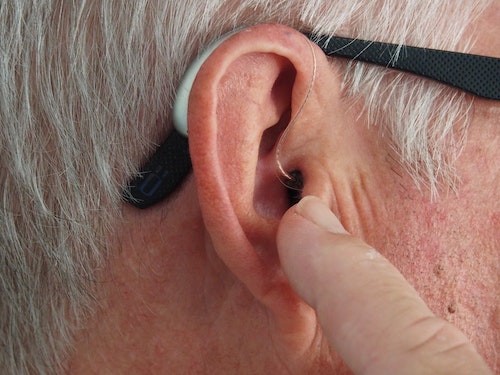
Can Hearing Aids Have a Cognitive Benefit for Seniors?
Use of hearing aids by adults with hearing loss was linked to a significant 19% relative reduction in risk of any cognitive decline, compared with uncorrected hearing loss across long-term studies with follow-up ranging from two to 25 years.
MedPage Today’s recent article entitled “Use It, or Lose It: Hearing Aids Linked to Cognitive Benefit” reports that hearing aid or cochlear implant use was also linked to a 3% improvement in short-term cognitive scores, according to Benjamin Kye Jyn Tan, MBBS, of the National University of Singapore, and colleagues.
“Importantly, this benefit is evident for both normal baseline cognition and baseline mild cognitive impairment,” after “adjusting for possible confounders, including age and gender, education, socioeconomic status, and comorbidities,” the group reported in JAMA Neurology.
Hearing loss has been identified as a top modifiable risk factor for dementia, the researchers noted. “This study adds to the growing evidence base and serves as an impetus for clinicians treating patients with hearing loss to persuade them to adopt hearing restorative devices, to mitigate their risk of cognitive decline, such as dementia.”
While the analysis couldn’t establish causality, the findings support inclusion of hearing evaluation “as part of a standard workup for patients who may be experiencing cognitive decline,” agreed an accompanying editorial by Justin S. Golub, MD, MS, of Columbia University Vagelos College of Physicians and Surgeons in New York City, and coauthors.
However, there’s been a hypothesis that hearing loss and cognitive decline might occur independently as a result of a common mechanism of age-related neurodegenerative processes, Tan’s group acknowledged.
While noting that “hearing loss in dementia is likely to be multifactorial,” the study authors discussed several theories for how hearing aids might exert cognitive benefits. For example, the “sensory deficit hypothesis suggests that lack of sensory input may lead to structural alterations [in the brain], including atrophy,” they wrote. “Allowing hearing restorative devices to provide sensory stimulation before prolonged deprivation may cause cortical changes that could prevent cognitive deterioration.”
Another possible mechanism, they added, is that “hearing aid use may prevent social isolation [well-known to accompany hearing loss] and its resultant development of cognitive impairment, although further studies are required to analyze this association.”
The analysis examined long-term associations between hearing aid use and cognitive decline in a pooled analysis of eight studies with a total of 126,903 participants, as well as short-term outcomes in 11 studies with a total of 568 participants. Most were prospective cohorts or other observational designs; the two randomized clinical trials had only short-term data available.
Reference: MedPage Today (Dec. 5, 2022) “Use It, or Lose It: Hearing Aids Linked to Cognitive Benefit”









